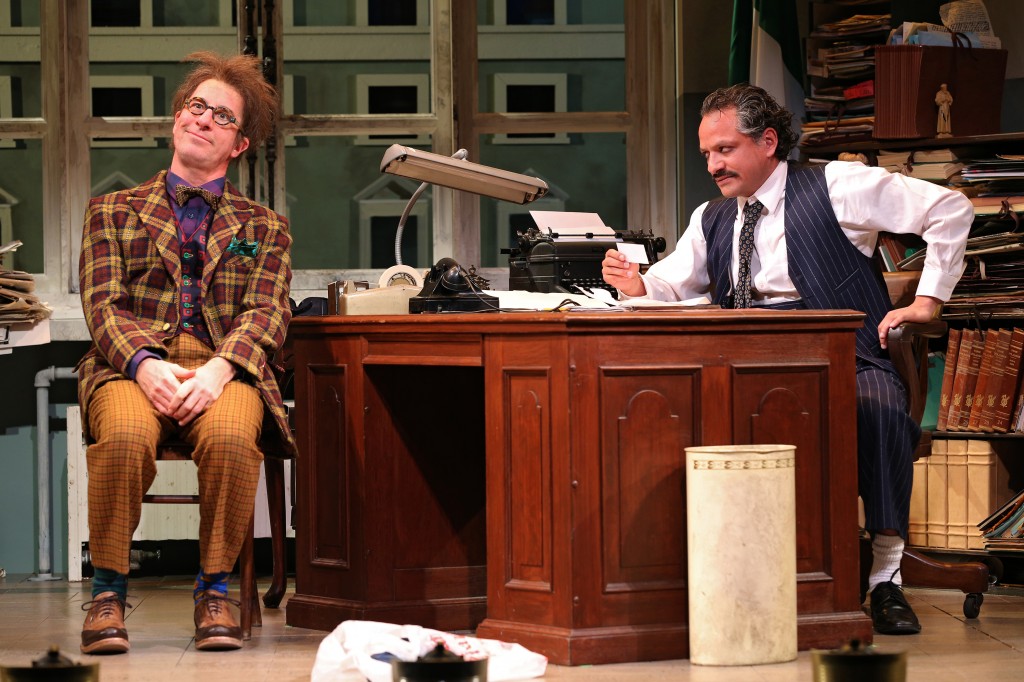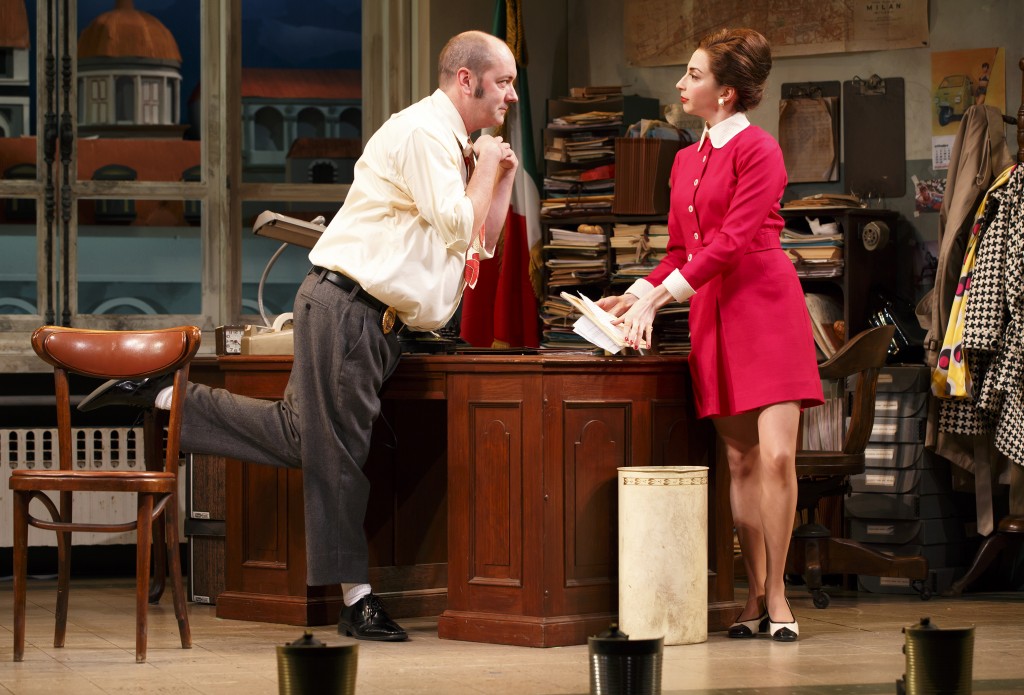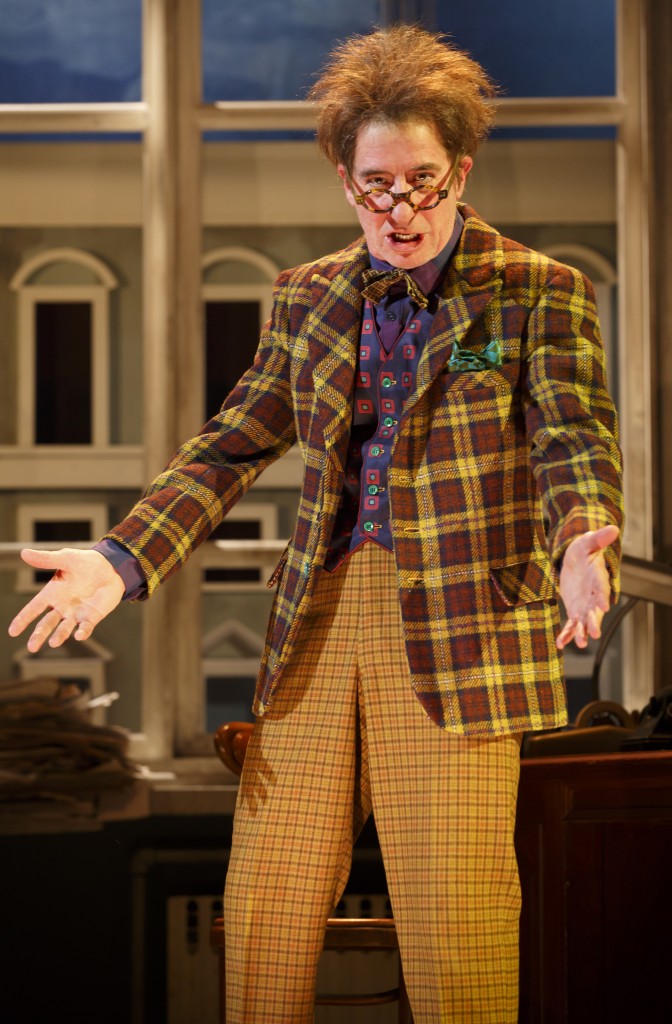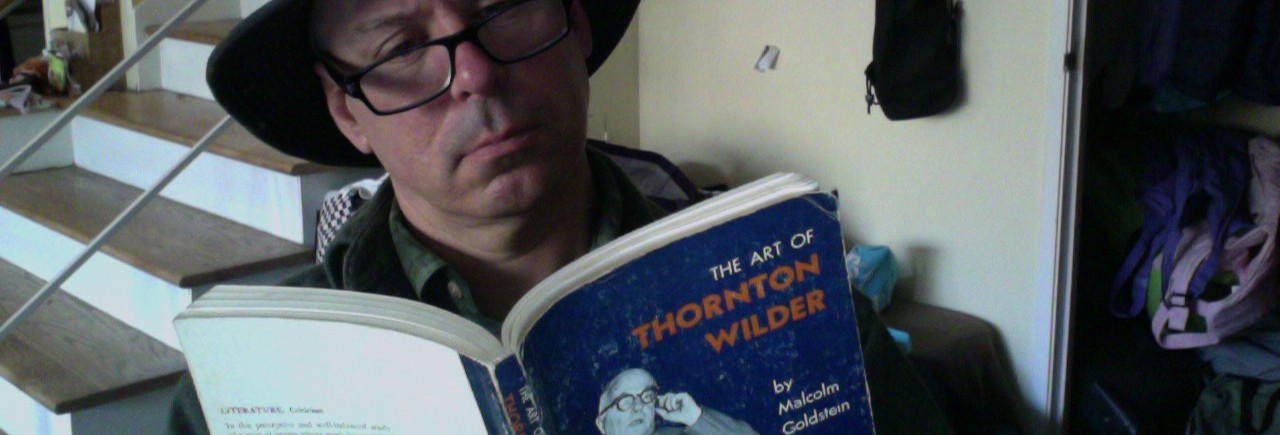
So I saw Accidental Death of an Anarchist at Yale Rep again. My overlong, overthought, original review of the Dario Fo play, directed by Christopher Bayes and starring Steven Epp, is on the New Haven Independent site, here.
I had three objectives in going again:
- I wanted to assess how this tightly-wound comic troupe (led by Steven Epp) operated at the end of its run compared to the friendly opening night crowd of a few weeks earlier.
- I wanted to radicalize one of my daughters.
- I dug the show and wanted to see it another time.
It held up great. The snowy-Thursday audience was tough, but the cast kept the energy up. The timing was exactly the same, and the crowd caught on. The anarchist anthem got cheers and applause, as did recent Yale School of Drama grad Molly Bernard’s speed-rap as an incredulous journalist.

I’ve seen Accidental Death of an Anarchist plenty of times over the years. When I was in college in the early ‘80s, the play was all the rage. Then I got to see Dario Fo himself perform (at the Rep, on his first tour of the U.S., in tandem with his equally extraordinary wife Franca Rame), and felt that a lot of the productions I’d seen of his plays were underplaying the physical shtick. Fo is shouty AND pointy, and this new production gets that. It also resounds with big musical cues and magical special effects.
At Thursday’s performance there was an interesting variable—an understudy. Winston Duke went on for Allen Gilmore in the role of Pissani. Duke graduated from the Yale School of Drama (from whence the Rep gets all its understudies) this year. I’d seen him in a few shows at the Drama School and the Yale Cabaret, but in pretty dark stuff like Athol Fugard’s The Island and Christina Anderson’s Blacktop Sky. Duke’s about a head taller than Gilmore, which certainly helped him assert himself right away. He also worked hard to equal the frantic physical-comedy standard set by the smooth-gliding Jesse J. Perez (as detective Bertozzo), the sweet-voiced Eugene Ma (as a couple of constables) and the slow-burning Liam Craig, no mean feat.
Duke’s mere presence also added a few fresh jokes to the show, as when Epp (who improvises mightily throughout the show, not to mention all the rehearsed bits that he makes sound like improvisations) acknowledged him as “you! New guy! Understudy!,” or when Duke began Pissani’s abrupt stand-up comedy bit with “Welcome to the understudy performance. He may mess up, but you won’t know.”
The joke Duke told at that point, an Adam & Eve gag with the punchline “Gee, that’s a hard one,” was the only thing I had trouble explaining to my nine-year-old daughter Sally after the show. It was wonderful bringing her. She loved the Bugs Bunny burlesqueries, and how the characters break into song (“Kung Fu Fighting,” “Do Re Mi”) at the drop of a suggestive bit of dialogue. But she also got, as I tried to explained before I brought her, that Dario Fo’s comedies aren’t just clown shows. They’re about abuses of power.
It may be counterintuitive since I’m their father, but I want my daughters to be able to question authority and identify when anyone has overstepped their bounds in telling them what to do. I want them to know that there are many ways of doing things in the world. Many ways to organize, many ways to subvert. Many ways to amuse. Dario Fo, particularly as distilled in this something-for-everyone, laugh-a-minute production, was a good lesson for Sally, not to mention grand entertainment. I was encouraged to see another young girl in Thursday’s audience, an 11-year-old friend of my other daughter Mabel. I don’t necessarily recommend you bring your own children to see Accidental Death of an Anarchist, but it worked for us.
Sally had her favorite jokes, but she also had the right questions about how some people lie and cheat to protect themselves, at the expense of others. She liked the idea of such deceptions being turned around on the deceivers, by an alleged “Maniac” who makes more sense than a roomful of policemen. She was also troubled, as she should be, by the show’s mind-blowing ending. There’s an innocent victim in it, and Sally found that unfair. It was fodder for a real discussion about social injustice.
As Epp intones, before a starry sky, in Accidental Death of an Anarchist’s final moments, “There you have it. Not the happy ending you were looking for. But what’re you gonna do?
“No. Really. What are you going to do?”

This Accidental Death of an Anarchist is not dead. It’s got a few more performances this weekend at Yale Rep before heading to a whole other Rep, the production’s co-producer Berkeley Rep, for a March 7-April 20 West Coast run. With any luck, maybe it’ll spread to other theaters in the way Bayes & Epp’s production of Goldoni’s Servant of Two Masters did. They prove that Accidental Death of an Anarchist, written in 1970 about a real incident of police brutality, is a great vehicle to say pithy things about events of now, from NSA privacy violations to racial and gender imbalance on the American stage (including in this very show). As I said, it’s about something. Let’s keep it about.

Permalink
Chris The Joke Sally didn’t get was the only thing I didn’t really get either